26.04.2020.
Bravely against coronavirus
The introduction of a state of emergency in the Republic of Serbia due to the coronavirus pandemic has brought numerous emergency tasks to the Serbian Armed Forces. Thanks to its brave and courageous members, the military has successfully overcome new challenges without decreasing its combat readiness and demonstrating that, as always when difficult, the citizens of Serbia can rely on the main pillar of defence.
Among numerous members of the Serbian Armed Forces who distinguished themselves in performing their tasks in the fight against coronavirus are Major Ivan Stefanović of the 72nd Special Operations Brigade, Lieutenant Kristina Iklozan of the Third Army Brigade and Sergeant 1st Class Milos Nedeljković of the Signal Brigade’s 4th Signal Battalion. These are the stories of their experiences with the fight against the coronavirus.
It is my wish and my duty to help patients
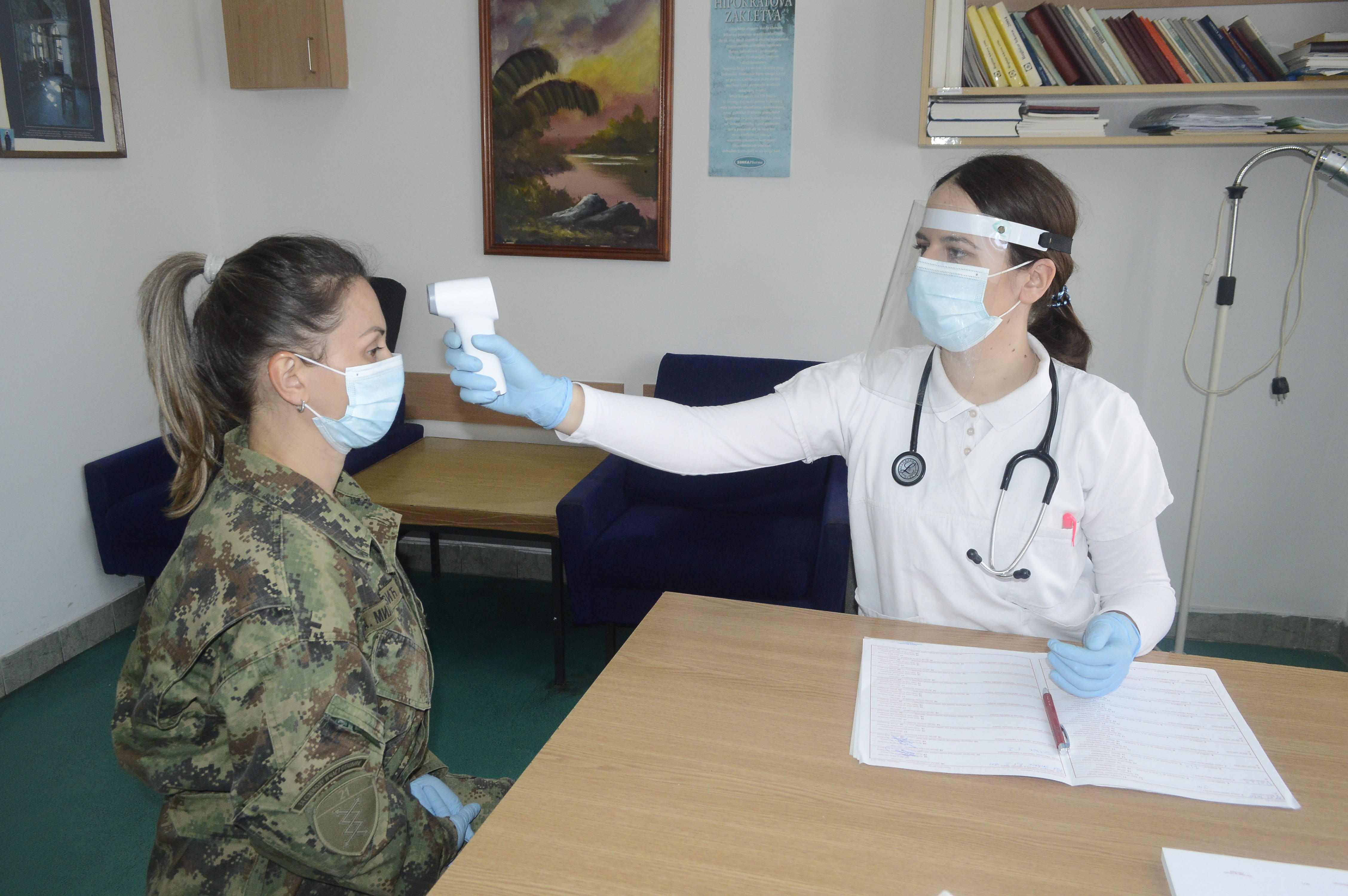 Lieutenant Kristina Iklozan graduated from the Medical Faculty of the Military Medical Academy two years ago and has since worked as a general practitioner at the “Knjaz Mihailo” barracks’ infirmary in Niš, in the Third Army Brigade. Even though she is young and the only doctor at this infirmary, her colleagues say she has distinguished herself with prompt and timely response in the treatment of members of the military infected with Covid-19.
Lieutenant Kristina Iklozan graduated from the Medical Faculty of the Military Medical Academy two years ago and has since worked as a general practitioner at the “Knjaz Mihailo” barracks’ infirmary in Niš, in the Third Army Brigade. Even though she is young and the only doctor at this infirmary, her colleagues say she has distinguished herself with prompt and timely response in the treatment of members of the military infected with Covid-19.- I remember the day I was informed that several of our members tested positive for coronavirus. I arranged for my colleagues who were first tested in the Covid dispensary, to be transported by our ambulance to a temporary hospital in the “Čair” hall, since they had mild symptoms of the infection. The next evening, another colleague of ours, also with a mild clinical presentation, was referred for treatment - recalls Lieutenant Kristina Iklozan, who regularly inquired about the health of her colleagues after they were discharged from the hospital, since the test results after hospital treatment showed that they were cured.
Christina points out that at this moment the whole world is facing an enemy it is not familiar with, which makes the fight against it even more difficult.
- For the purpose of preventive measures and more efficient work, I established a triage checkpoint in front of the infirmary and separated emergency patients from those with chronic conditions. Taking temperature is required at the entrance and everyone gets a mask and gloves. I refer all the patients with suspected Covid-19, to the "Šivara" military Covid infirmary, where further laboratory tests are carried out and, if necessary, lung scans and test are performed. I also gave patients my private phone number so they could call and consult me at any time - says Kristina.
Asked how she copes with the fear that she might get infected with the virus herself, as well as with her professional challenges, she replies that her experienced colleagues help her a lot.
- There is a dose of fear that I might get infected, but that does not stop me from helping patients, because it is my duty. Although I am the only doctor in the infirmary, I do not feel alone because there are technicians, paramedics, pharmacists and a driver on my team. We are all together and we support each other. The advice of my colleagues who have been in the military for a long time and my colleagues in other infirmaries means a lot to me as a young doctor in a new situation - says Kristina, noting that the mask, gloves, the visor and protective clothing she wears on a daily basis rub her skin, but she is aware that she must protect herself in order to be able to help others. And when all this is over, the best lesson for her will be the experience she is getting now.
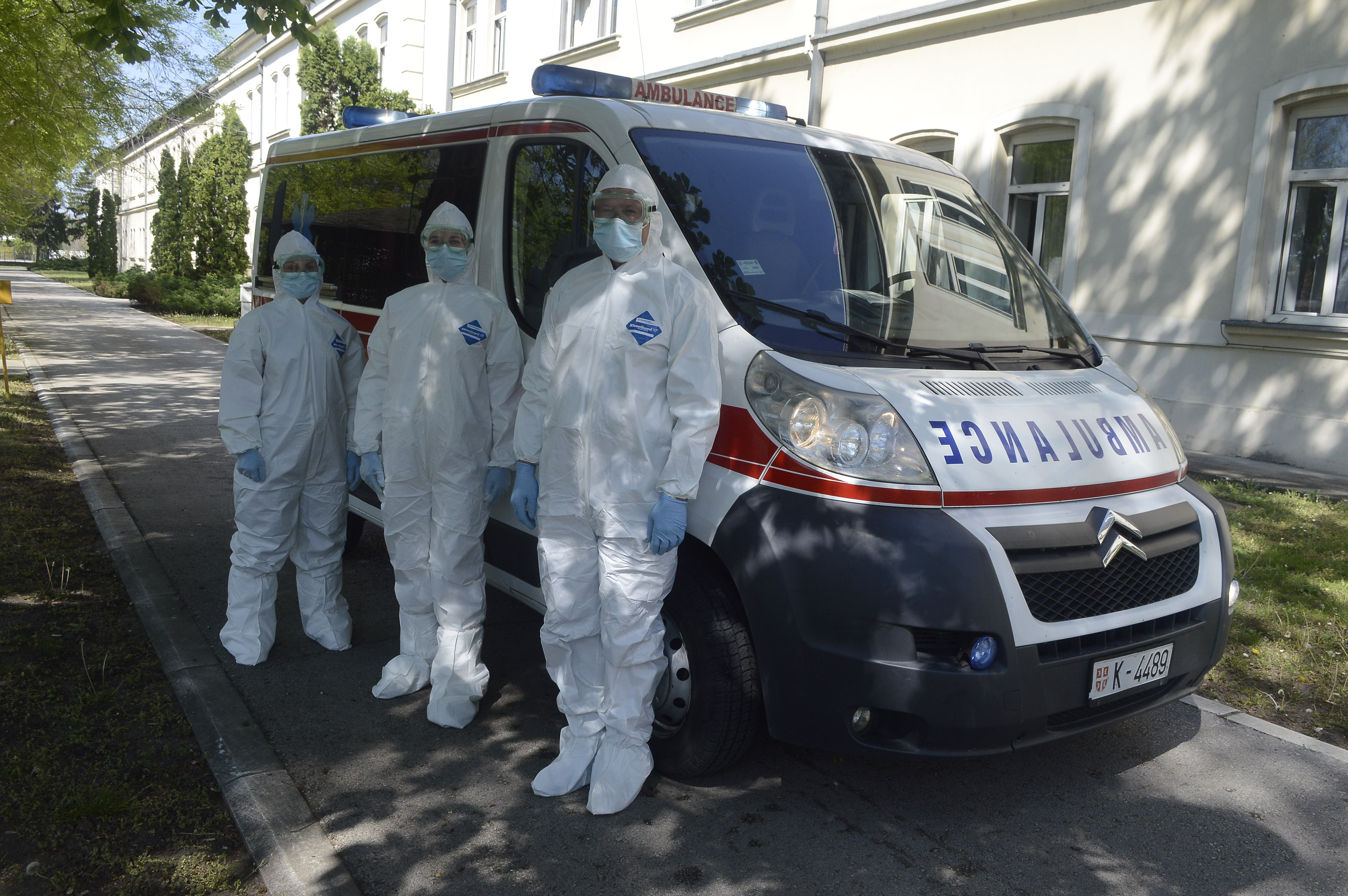 - I don't know if it is good or bad luck that I encounter this at the beginning of my career, but I know that this is a life experience that tells us not to take anything for granted. After all this, I think I will appreciate more my freedom and the time spent with family and friends - says Lieutenant Kristina Iklozan.
- I don't know if it is good or bad luck that I encounter this at the beginning of my career, but I know that this is a life experience that tells us not to take anything for granted. After all this, I think I will appreciate more my freedom and the time spent with family and friends - says Lieutenant Kristina Iklozan.None of the migrants are infected with the coronavirus
Since the introduction of a state of emergency, Major Ivan Stefanović, together with his colleagues from the 72nd Special Operations Brigade, has been engaged in the tasks of securing the ”Krnjača” Asylum Centre and the “Adaševci” Reception Centre, as well as vital facilities in Belgrade and Pančevo.
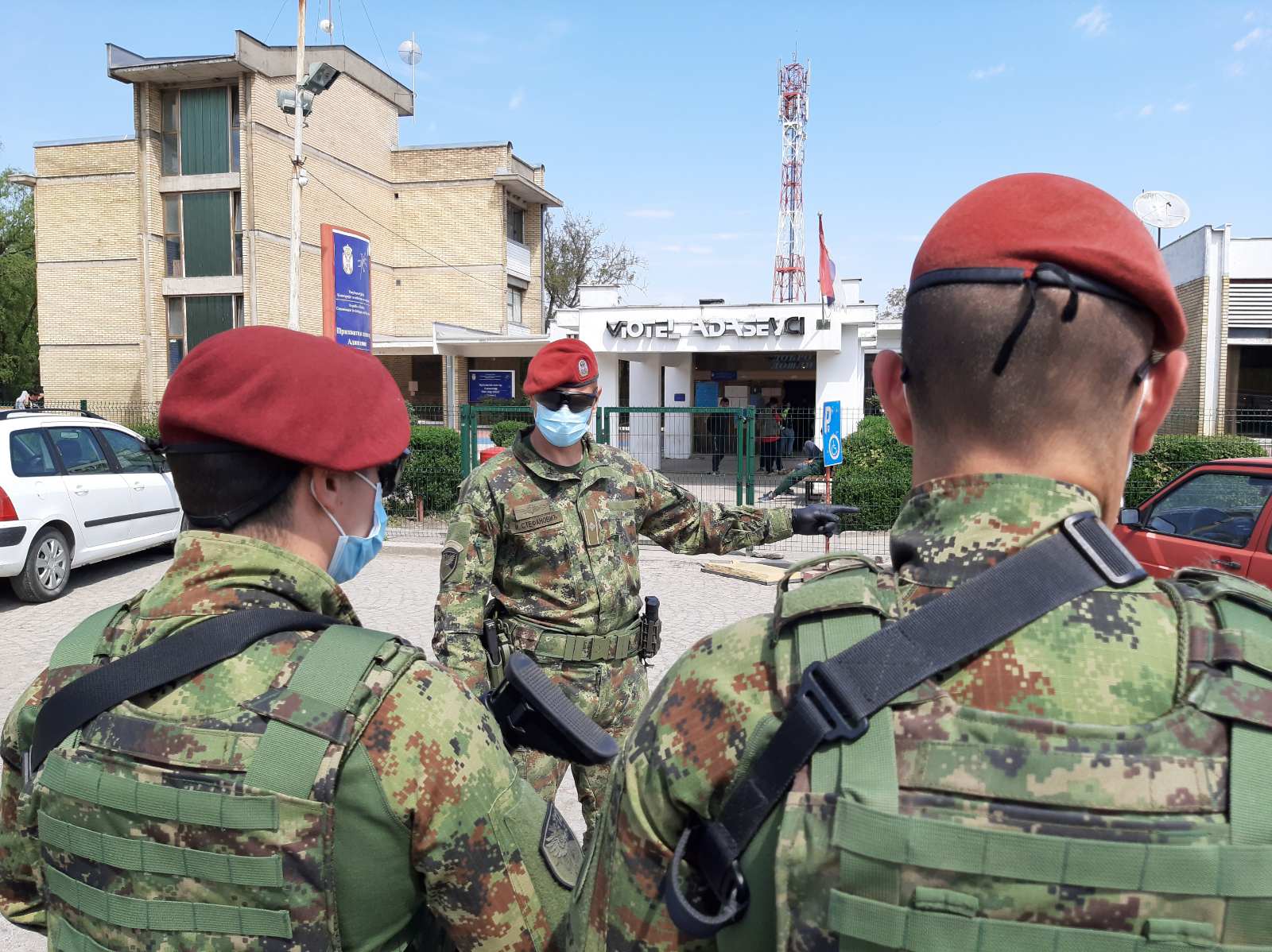 Securing the facilities housing migrants is a new task that the Serbian Armed Forces are faced with. Preparation time was short, but Major Stefanović emphasized that members of the Brigade were trained to respond swiftly to any challenges they face.
Securing the facilities housing migrants is a new task that the Serbian Armed Forces are faced with. Preparation time was short, but Major Stefanović emphasized that members of the Brigade were trained to respond swiftly to any challenges they face.- We have the same task In Adaševci and Krnjača, which is to prevent migrants from leaving the centres - says Major Stefanović.
The contact between the military and the migrants is kept to a minimum in the centres and for all their enquiries the military refer them to the employees of the Commissariat for Refugees, with whom they have excellent cooperation and understanding, says Major Stefanović.
 Securing migrant centres is a demanding job. Members of the 72nd Special Operations Brigade work in 14-day shifts or longer, and they use military camping gear or the existing masonry buildings for accommodation, located in the immediate vicinity of the centre. The possibility of a riot in the camp is a threat the military is prepared to face.
Securing migrant centres is a demanding job. Members of the 72nd Special Operations Brigade work in 14-day shifts or longer, and they use military camping gear or the existing masonry buildings for accommodation, located in the immediate vicinity of the centre. The possibility of a riot in the camp is a threat the military is prepared to face.- There was a fight among the migrants at the Asylum Centre in “Krnjača”. In response to this situation, standby forces were engaged and the entire centre was blocked, preventing an attempt to escape from the Centre. The Ministry of Internal Affairs of the Republic of Serbia was immediately contacted, and their forces also intervened, after which the situation in the Centre was brought under control. There have been escape attempts in both centres that have been successfully prevented, with minimal use of force, and in accordance with standard operating procedures and rules of engagement - explains Major Stefanović.
For more than 8,000 migrants housed in 20 reception and asylum centres in Serbia, there is a 24-hour ban on movement. Thanks to timely protective measures, there are no migrants infected with the coronavirus.
- Members of our unit are aware that by protecting migrants, they are protecting the citizens of the Republic of Serbia and their families. A unit like ours must have a strong staff. The success of the tasks ahead depends on it. It goes without saying that peer support is complete and unconditional, because we are all on the same mission. When it comes to our family members, they are aware of our contribution to the protection of both them and other citizens of Serbia, so they fully understand the longer absence of their fathers and husbands - Major Stefanović said.
An enterprise to be proud of
During the fight for the prevention of Covid-19, Sergeant First Class Miloš Nedeljković of the Signal Brigade’s 4th Signal Battalion, has temporarily replaced his regular telecommunications security duties with the tasks of reconstruction and construction of a new hospital at the “Karaburma” Military Medical Centre, for which he volunteered.
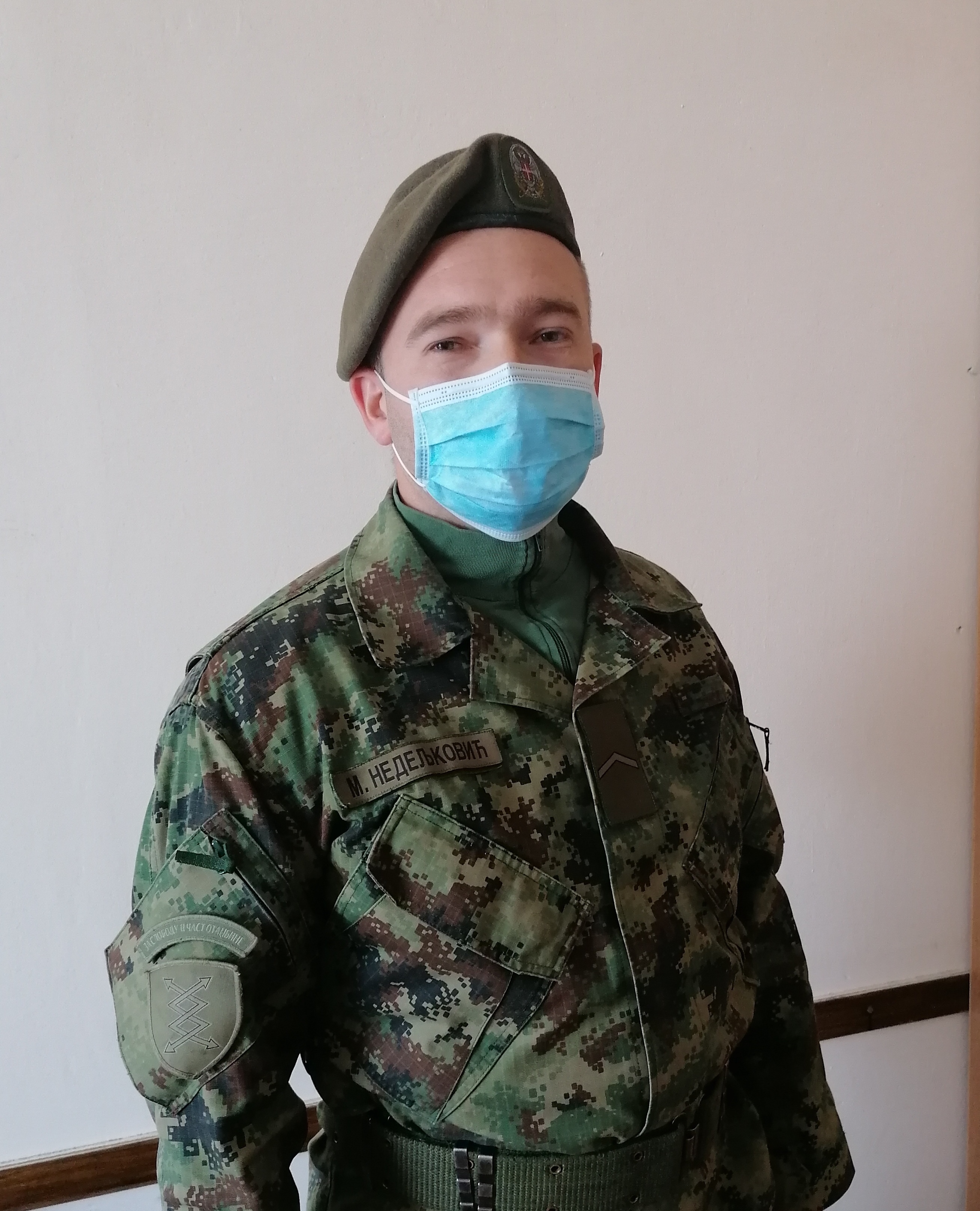 - Professional soldiers from the Fourth Signal Battalion, as well as the entire training platoon of soldiers on voluntary military service were under my direct command. I have to say that since the introduction of a state of emergency, soldiers who are doing voluntary military service have been enquiring if there will be opportunities for their engagement in assisting the citizens of Serbia at this difficult time, and later, when we participated in the construction of a new Covid hospital, they showed an extremely high level of motivation and worked well with professional soldiers even though they had no previous experience in such jobs.
- Professional soldiers from the Fourth Signal Battalion, as well as the entire training platoon of soldiers on voluntary military service were under my direct command. I have to say that since the introduction of a state of emergency, soldiers who are doing voluntary military service have been enquiring if there will be opportunities for their engagement in assisting the citizens of Serbia at this difficult time, and later, when we participated in the construction of a new Covid hospital, they showed an extremely high level of motivation and worked well with professional soldiers even though they had no previous experience in such jobs.At the site of a dilapidated warehouse for reserve assets, a new hospital for the treatment of patients with severe clinical presentation of Covid-19 was built in record time. Sergeant First Class Nedeljković believes that such an achievement is the result of an exceptional staff organization of “Termomont” and partners, the donor companies, but also of the organization of medical staff engaged at “Karaburma” Military Medical Centre, and coordinated cooperation with members of other units, among which units of the Training Command stood out.
- I am very pleased with the work of my men and proud that despite the demanding tasks, no one was injured or infected with the coronavirus. Protective measures were implemented and I personally made sure that they were respected - Nedeljković points out.
The speed of construction and equipping of the new Covid Hospital at the “Karaburma” Military Medical Centre is an endeavour that will be remembered by the whole of Serbia, and especially by those who participated in it.
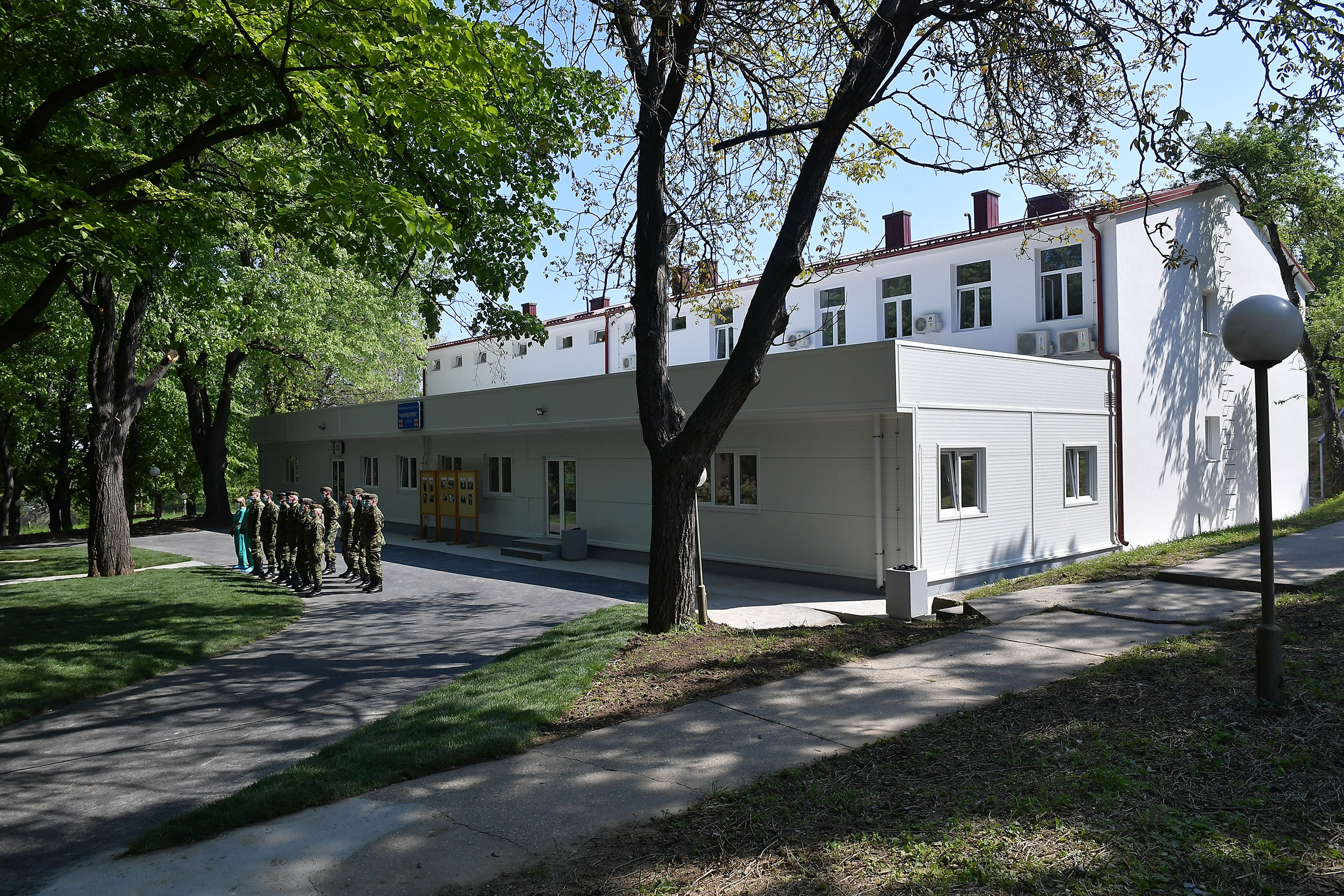 - I am happy that I have worked on the construction of the new Covid hospital, together with my colleagues, and that after the state of emergency and the epidemic have passed, it will continue to be used for the treatment of Serbian citizens - emphasizes Sergeant First Class Nedeljković.
- I am happy that I have worked on the construction of the new Covid hospital, together with my colleagues, and that after the state of emergency and the epidemic have passed, it will continue to be used for the treatment of Serbian citizens - emphasizes Sergeant First Class Nedeljković.After completing the construction of the new hospital, he returned to his regular tasks in the brigade, but he says that if needed, he is willing to participate again in the activities that would help beat Covid-19. He says that members of the military are aware that there is a possibility of getting infected at work, but that he is not afraid because “military profession is such that you simply accept responsibility and are governed by the feeling that you will help people with your work."



